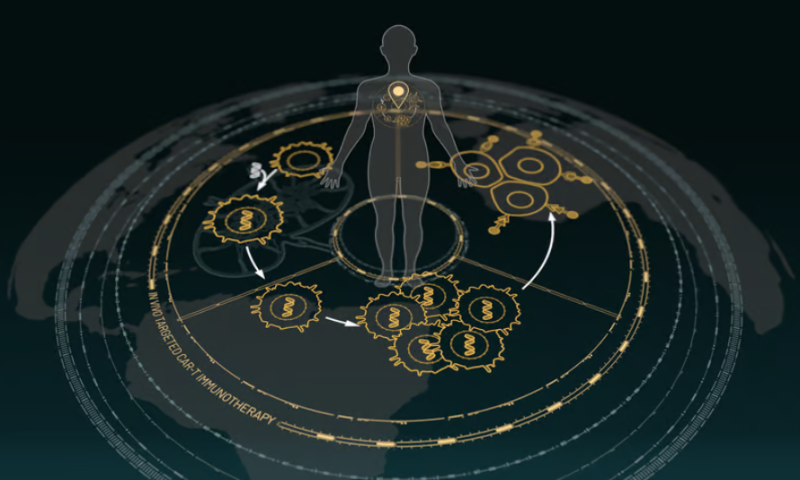It’s a statistic that haunts David Fontana, Ph.D., chief operating officer of Umoja Biopharma: At a time when manufacturing space is hard to come by, as many patients die waiting for CAR-T cell therapy as are actually treated.
“Physicians … are having to choose which patient [gets the therapy]. Do we go with the sick elderly one that has no hope, or the healthy one that can probably survive?” Fontana told Fierce Biotech at the American Society for Gene and Cell Therapy’s (ASGCT’s) annual meeting. “I’ve started calling them the ‘Goldilocks patients’: The ones who aren’t too sick, not too well. You’re narrowly defining these patients simply because of these supply chain issues.”
Umoja wants to offer a solution. The biotech is working on ways to confront all the major limitations of CAR T-cell therapy—the lengthy, pricey manufacturing process and the poor efficacy against solid tumors—with therapies that reengineer a patient’s T cells within their own body, rather than removing and redelivering them the way current autologous CAR T-cell therapy is administered today. It’s also in the process of establishing partnerships with Big Pharma companies that want to take their ex vivo therapies in vivo by pairing them with Umoja’s VivoVec gene delivery system, which the company is aiming to manufacture end-to-end at its forthcoming plant in Colorado.
“We know we can manufacture 100% of our own supply chain, so that’s attractive to partners,” Fontana said, especially in light of the ongoing shortage of lentiviral vectors. Though no deals have been announced yet, Umoja is “actively pursuing” partnerships, he added.
What the company has announced is new preclinical data validating its therapeutic approach in solid tumors. On May 17 at ASGCT, researcher Alyssa Sheih, Ph.D., showed how Umoja’s gene delivery platform UB-VV200, which uses the company’s VivoVec technology, combined with UB-TT170, a folate receptor-targeting version of its small-molecule adapter TumorTag technology, was able to generate CAR T cells in vivo and successfully control solid tumor growth in mice.
A brief overview of how all the pieces work together: The scientists administer UB-VV200, an engineered lentiviral vector that encodes a universal CAR called a TagCAR along with the company’s synthetic cytokine system, RACR, which helps the CAR T cells expand and persist without the need for pre-treatment chemotherapy. UB-VV200 selectively binds, activates and transduces the T cells, resulting in TagCAR expression on their surface. The TagCAR-T cells will bind to the TumorTag coated folate receptor-expressing tumors—in this instance, the TumorTag UB-TT170, which binds to folate receptors.
Looking at mice with xenografts of folate receptor-expressing tumor cells, the researchers saw that UB-VV200 controlled solid tumor growth in a dose-dependent manner. The more TagCAR T cells that were generated, the smaller the tumor volume. Umoja is conducting ongoing nonhuman primate studies, which the company described as “encouraging” so far. Details are to be presented at an upcoming medical conference, though Umoja declined to disclose which one.
The Seattle Children’s Research Institute is currently testing Umoja’s UB-TT170 in pediatric osteosarcoma, a folate receptor-expressing tumor type, with plans to expand into gynecological tumors. The company also intends to submit an investigational new drug application for human testing with the FDA for UB-VV200 by the second half of 2024. Other preclinical assets include UB-VV111, a CD-19 CAR T-cell therapy for hematological cancer.
Meanwhile, the company is busy finishing up the manufacturing plant in Louisville, Colorado, dubbed The Colorado Laboratory & Innovative Manufacturing Building, or The CLIMB. The $70 million plant will span 77,000 square feet and is expected to open later this year.
Producing an off-the-shelf, in vivo CAR T therapy rather than an ex vivo one allows the company to make more efficient use of its manufacturing space, Senior Vice President of Translational Sciences Ryan Larson explained. Autologous ex vivo CAR T cell therapies are produced for each individual patient, so each batch of CAR T cells must be produced one at a time.
In contrast, “we can scale up—we don’t have to scale out,” Larson said. As demand for Umoja’s therapies grows, along with the number of partners that want to use the VivoVec platform to convert their own CAR T cell therapies to in vivo products, “we can just increase the volume of our bioreactors.”
Given the manufacturing challenges and other accessibility issues associated with autologous CAR T-cell therapies, it’s likely that the field more broadly is headed toward an in vivo approach, Larson said. There’s a precedent for this already in the gene therapy space. Gene therapies started out with genes being transduced into cells outside a patient’s body, then over time began to move in-patient as the technology improved. The same thing is happening with CAR T-cell therapies: As the treatment’s power has become clear, researchers are looking for ways to make it more accessible.
“Now, to me, it’s an obvious next step if you can make a truly off-the-shelf product that engineers the patient’s own cells in vivo essentially an autologous product—it’s your T cells—and you bypass all the complexity of the ex vivo approach by going directly in vivo,” Larson said. “I would say yeah, it’s definitely the way of the future.”

